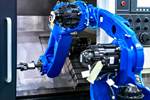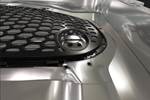What Does Automation Look Like in Moldmaking?
There are a variety of technologies and products that can help optimize and automate the manufacturing processes involved in moldmaking.

An informal survey of MMT readers reveals that most respondents believe about 50-60% of the moldmaking process can be automated, but that less than 5% of mold builders are actually automated. Most respondents believe that 100% of mold builders should have some level of automation or they simply can’t do the work or be competitive. This is a shame because the right automated approach can drive consistency, tighter tolerance capabilities, faster build times, exceptional quality and excellent capacity.
However, before implementing an automation strategy, a mold shop must justify the automation and that depends on your business model (work type, required tolerances, type of machining and available capital) and the area in which you should place automation to make your process more efficient. Automation applies simple to advanced manufacturing technology to building molds that can improve throughput and remove time from quoting, design, programming and machining.
So, how do you define automation and where are you currently applying it within your moldmaking operation? Here are a few industry insights on how some MMT readers define automation and where they see it being applied:
- Use of artificial intelligence, cloud computing, cybersecurity and real-time data.
- Standardizing the way you work (your process).
- Automated mold design by CAD-capturing company knowledge and making that knowledge reusable — an automated design platform based on its historical data store of similar geometries/cavitation that creates an injection mold design around the details of the part or product to become the foundation of the design.
- Automated programming solutions, from recognizing geometric features in a CAD model and instantaneously creating machining code to produce whole-part strategies that simplify the programming of complex, feature-rich molds.
- Solutions that improve unmanned machine run time.
- Any CNC machine with simple multi-piece part workholding that can run unattended for long periods without the manual interactions of a human operator.
- Automation cells representing the key machining processes — rough cutting, hard cutting, grinding, graphite/electrode machining, wire and sinker EDM and CMM.
- Automating the flow of electronic data and physical electrodes to the shop floor for pain-free die-sinking.
- Adaptive EDM generators for wire and sinker EDM.
- Toolchangers.
- Shrink-fit toolholders.
- Quick-change tooling.
- 3R palletization and robotics.
- Lights-out machining using the latest tooling, programming, fixturing, automation and control data.
- Linking multiple machine centers with robotic workpiece management and embedding metrology equipment to allow for closed-loop fabrication and quality.
- Automated measurement solutions, including CMMs and vision measuring systems designed for robots that place and remove workpieces for automated measurements.
- Innovative software that captures measurements and moves the data into a centralized system for analyzing and reporting.
- Tending/loading and unloading.
- Cobots.
So, what does automation look like in your shop?
(Thank you to Omega Tool, Cavalier, Open Mind, Scholle IPN, Haimer, Autodesk, Heidehain, Makino and Jingdiao).
Related Content
-
Tackling a Mold Designer Shortage
Survey findings reveal a shortage of skilled mold designers and engineers in the moldmaking community, calling for intervention through educational programs and exploration of training alternatives while seeking input from those who have addressed the issue successfully.
-
More Than Moldmaking at PTXPO 2023
The Moldmaking Pavilion returns to the Plastics Technology Expo (PTXPO) March 28-30, 2023, at the Donald E. Stephens Convention Center in Rosemont, Illinois, but there’s more to discover than moldmaking.
-
Got Any Useful Moldmaking Education and Training Resources?
MMT wants to promote moldmaking-specific apprenticeship programs, technical schools, university classes, training initiatives or workshops to help educate the next generation of mold manufacturing professionals.










_300x250 4.png;maxWidth=300;quality=90)

.jpg;maxWidth=300;quality=90)
.png;maxWidth=300;quality=90)


